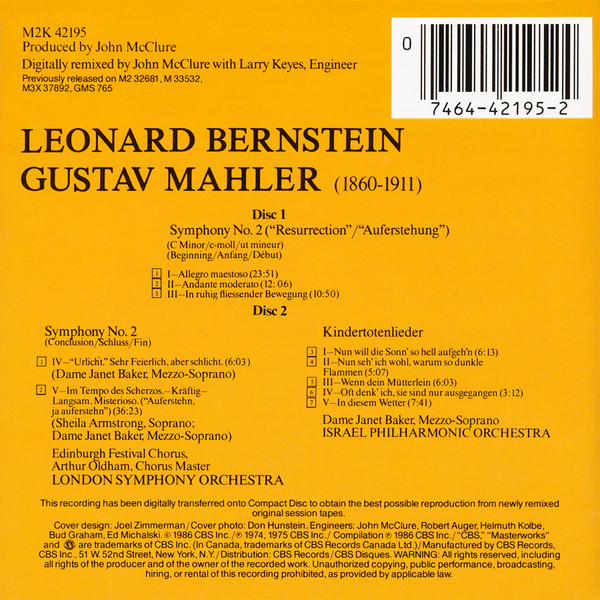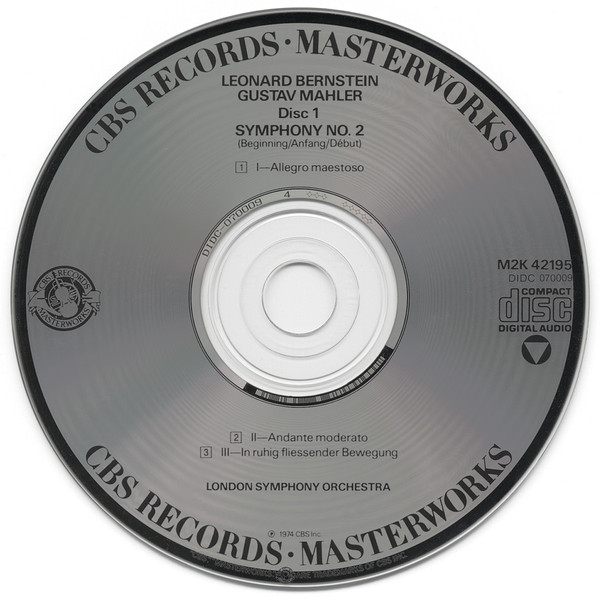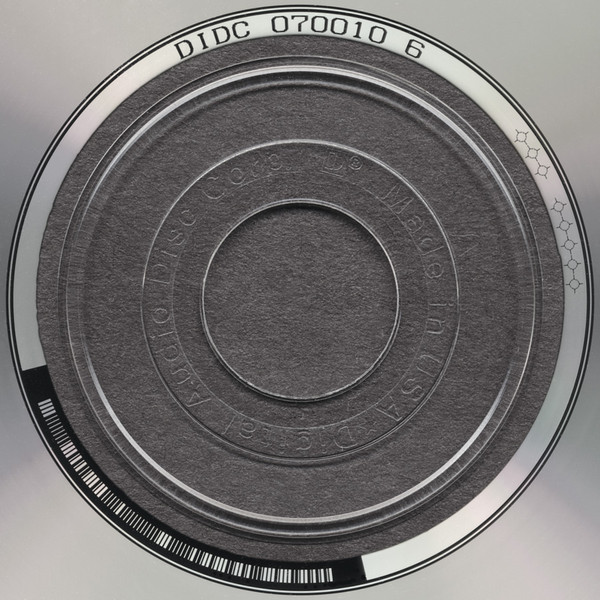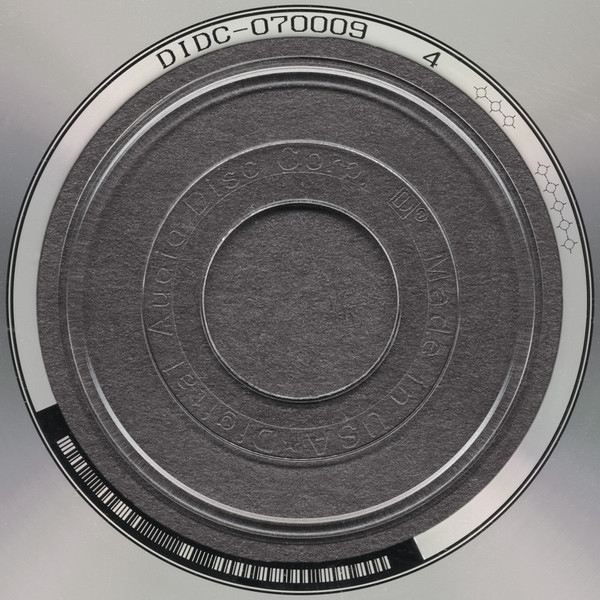Mahler Bernstein - Symphony No 2 Kindertotenlieder
Table of Contents
Download
Filename: mahler-bernstein-symphony-no-2-kindertotenlieder.zip- MP3 size: 63.8 mb
- FLAC size: 364.1 mb
Tracks
| Track | Duration | Preview |
|---|---|---|
| V - In Diesem Wetter | 7:41 | |
| II - Andante Moderato | 12:06 | |
| V - Im Tempo Des Scherzos. - Kräftig. - Langsam. Misterioso. ("Auferstehn, Ja Auferstehn") | 36:23 | |
| IV - Oft Denk' Ich, Sie Sind Nur Ausgegangen | 3:12 | |
| V - Im Tempo Des Scherzos. - Kräftig - Langsam. Misterioso. ("Auferstehn, Ja Auferstehn") | 36:23 | |
| II - Nun Seh' Ich Wohl, Warum So Dunkle Flammen | 5:07 | |
| III - Wenn Dein Mütterlein | 6:03 | |
| I - Allegro Maestoso | 23:51 | |
| IV - "Urlicht." Sehr Feierlich, Aber Schlicht. | 6:03 | |
| I - Nun Will Die Sonn' So Hell Aufgeh'n | 6:13 | |
| III - In Ruhig Fliessender Bewegung | 10:50 |
Images






Catalog Numbers
M2K 42195Labels
CBS MasterworksListen online
- online luisteren
- lytte på nettet
- écouter en ligne
- lyssna på nätet
- kuunnella verkossa
- ascolta in linea
- escuchar en línea
- online anhören
- ouvir online
Formats
- 2 × CD
- Compilation
Companies
| Role | Company |
|---|---|
| Phonographic Copyright (p) | CBS Inc. |
| Copyright (c) | CBS Inc. |
| Manufactured By | CBS Records Inc. |
| Distributed By | CBS Records Inc. |
| Pressed By | Digital Audio Disc Corp. |
Credits
| Role | Credit |
|---|---|
| Chorus | Edinburgh Festival Chorus (tracks: 1-1 through 2-2) |
| Chorus Master | Arthur Oldham (tracks: 1-1 through 2-2) |
| Composed By | Gustav Mahler |
| Conductor | Leonard Bernstein |
| Design | Joel Zimmerman |
| Engineer | Bob Auger, Bud Graham, Ed Michalski, Hellmuth Kolbe, John McClure |
| Liner Notes | Edward Downes, Leonard Bernstein |
| Mezzo-soprano Vocals | Dame Janet Baker (tracks: 2-2 through 2-7) |
| Orchestra | Israel Philharmonic Orchestra (tracks: 2-3 through 2-7), London Symphony Orchestra (tracks: 1-1 through 2-2) |
| Photography By | Don Hunstein |
| Producer | John McClure |
| Remix | John McClure, Larry Keyes |
| Soprano Vocals | Sheila Armstrong (tracks: 2-2) |
| Words By | Friedrich Rückert (tracks: 2-3 through 2-7) |
| Lyrics By | Friedrich Rückert (tracks: 2-3 to 2-7) |
Notes
- The liner notes contain a reprint of an article on Mahler (written by Leonard Bernstein) which appeared in the September, 1967 issue of High Fidelity Magazine. The reprint and liner notes are presented in English, German and French.
- German translator Wolfgang Steuhl is also credited as Dr. W. Steuhl in portions of the booklet.
- No credit is given for any of the French translations.
- Digitally Mastered Analog Recording. This recording has been digitally transferred onto Compact Disc to obtain the best possible reproduction from newly remixed original session tapes.
- Previously released on M2 32681, M 33532, M3X 37892, GMS 765
- Compilation ℗ 1986 CBS Inc.
- Cover printed in Holland, CDs printed in Austria. English, German and French liner notes. No information on the translator of the French liner notes is included.
Barcodes
- Barcode (Text): 0 7464-42195-2
- Matrix / Runout (Disc 1): DIDC-070009 4
- Matrix / Runout (Disc 2): DIDC 070010 6
- Other (Both discs, embossed on hub): Made In USA ★ Digital Audio Disc Corp. [DADC logo] ®
- Distribution Code: CB 772
About Mahler Bernstein
Austrian composer and conductor.
Born 7 July 1860 in Kalischt, Bohemia (today Kaliště, Czech Republic) and died 18 May 1911 in Vienna, Austria.
Gustav Mahler (German pronunciation: ; was a late-Romantic Austrian-Bohemian composer and one of the leading conductors of his generation. As a composer, he acted as a bridge between the 19th century Austro-German tradition and the modernism of the early 20th century. While in his lifetime his status as a conductor was established beyond question, his own music gained wide popularity only after periods of relative neglect which included a ban on its performance in much of Europe during the Nazi era. After 1945 the music was discovered and championed by a new generation of listeners; Mahler then became one of the most frequently performed and recorded of all composers, a position he has sustained into the 21st century.
Born in humble circumstances, Mahler showed his musical gifts at an early age. After graduating from the Vienna Conservatory in 1878, he held a succession of conducting posts of rising importance in the opera houses of Europe, culminating in his appointment in 1897 as director of the Vienna Court Opera (Hofoper). During his ten years in Vienna, Mahlerwho had converted to Catholicism from Judaism to secure the postexperienced regular opposition and hostility from the anti-Semitic press. Nevertheless, his innovative productions and insistence on the highest performance standards ensured his reputation as one of the greatest of opera conductors, particularly as an interpreter of the stage works of and . Late in his life he was briefly director of New York's and .
He wed fellow composer and musician on 9 March 1902. They had two daughters, Maria Anna Mahler (03.11.1902-05.07.1907) & .
Mahler's œuvre is relatively smallfor much of his life composing was a part-time activity, secondary to conductingand is confined to the genres of symphony and song, except for one piano quartet. Most of his ten symphonies are very large-scale works, several of which employ soloists and choirs in addition to augmented orchestral forces. These works were often controversial when first performed, and were slow to receive critical and popular approval; an exception was the triumphant premiere of his Eighth Symphony in 1910. Mahler's immediate musical successors were the composers of the Second Viennese School, notably , and . and are among later 20th-century composers who admired and were influenced by Mahler. The International Gustav Mahler Institute was established in 1955, to honour the composer's life and work.
Real Name
- Gustav Mahler
Name Vars
- Fauré
- G. Mahler
- G. Meler
- G.Mahler
- Gustav
- Gustave Mahler
- Maher
- Mahler
- Mahler G.
- Mahler Gustav
- Mahler, Gustav
- Malher
- Marhler
- Μάλερ
- Г. Малер
- Г.Малер
- Густав Малер
- Малер
- °¹¿ÕûÞüéü
- Þüéü
